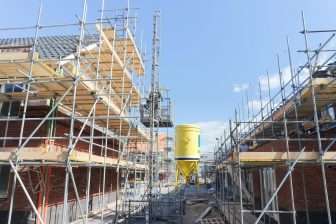 Housing delivery in London is facing a deepening crisis, with a new report from the Home Builders Federation (HBF) warning that the capital is on track to miss government housebuilding targets without urgent intervention to improve the viability and pace of development.
Housing delivery in London is facing a deepening crisis, with a new report from the Home Builders Federation (HBF) warning that the capital is on track to miss government housebuilding targets without urgent intervention to improve the viability and pace of development.
In its latest publication, Mind the Gap, the HBF outlines a series of critical barriers – ranging from planning delays and excessive policy burdens to affordability constraints and declining buyer demand – that are “strangling” attempts to build new homes in London.
The capital is expected to deliver 440,000 of the government’s 1.5 million homes target by 2030. However, housing completions and planning approvals are both falling year-on-year, putting this contribution at serious risk.
Stark decline in delivery and permissions
The report reveals that just 30,000 new homes were completed in London in the year to June 2025, based on Energy Performance Certificate data. This represents a 12% drop from the previous year and remains well below pre-pandemic levels.
Even more concerning is the collapse in planning approvals. Just 966 new residential schemes were approved in the 12 months to June 2025—the lowest number since records began in 2006. The overall share of UK housing delivery in London has fallen from 20% a decade ago to just 15% today.
Starts on new sites are also falling fast, down 38% year-on-year. With the government’s Standard Method setting a target of 88,000 homes per year for London, output would need to increase by 175%—more than double current levels—to meet that requirement.
Affordability crisis reaches new extremes
The housing affordability crisis – now affecting the entire country—is particularly acute in London. With no government support currently available for buyers, and limited access to affordable mortgage lending, homeownership is increasingly out of reach for most.
According to the HBF, a first-time buyer in London would need to save 50% of their discretionary income for more than 13 years just to afford a deposit. Average deposits now stand at nearly seven times annual income after bills. London’s house price-to-earnings ratio sits at 11, compared to 7.7 nationally, and the average first home costs 17 times the net annual salary of a 22- to 29-year-old.
Only 15% of first-time buyers purchased in London in 2023/24 – down from 25% a decade ago. At the same time, the proportion of households renting privately has more than doubled, while the share of mortgaged households has fallen from 39% to just 25%.
This weakening demand is eroding developer confidence, undermining investment in new sites, and contributing to the slowdown in delivery.
Policy and planning bottlenecks
The report highlights several structural challenges that are compounding the delivery crisis. Chief among them are severe planning delays and the complexity of the current London Plan, which contains 88 residential policies in addition to local and national requirements. This has made the process more time-consuming, expensive, and frequently unviable.
The role of the Building Safety Regulator has also come under scrutiny, particularly given London’s reliance on high-rise developments. As of mid-2025, nearly 10,000 homes were stalled at Gateway Two for more than six months. Additional policy burdens—including mandatory dual staircases, carbon offset payments, and various infrastructure levies—have added unsustainable costs, particularly for apartment-led schemes.
London’s 35% affordable housing requirement is another major hurdle. With limited availability of Registered Providers to take on Section 106 units, most schemes are forced into protracted viability negotiations, delaying progress further.
A need for targeted solutions
To address affordability, the HBF argues for the introduction of a tailored equity loan scheme. This, it says, could unlock 17,500 additional homes and help more than 90,000 people into homeownership over the next five years. Currently, only the top 30% of earners can afford to buy in the capital without support.
Brownfield development—a key part of London’s housing pipeline—is also under threat from rising remediation costs and new policy requirements such as Biodiversity Net Gain and increased Landfill Tax liabilities.
Calls for action
The HBF is calling on both the Mayor of London and central government to take immediate steps to reverse the downward trend in housing delivery. Among the report’s key recommendations are:
Review and simplify the London Plan, including aligning local energy policies with national standards and introducing exemptions for smaller schemes.
Lower the affordable housing fast-track threshold to 25%, to unlock more developments.
Accelerate the green belt review process, to identify land suitable for sustainable development.
Cancel the planned Building Safety Levy, which the HBF says will further harm the viability of new housing—especially affordable homes.
Reintroduce a government-backed homeownership scheme to restore buyer confidence and support first-time buyers.
Address delays in the Section 106 market and tackle electrical capacity issues, which are currently restricting growth.
Without immediate and coordinated action, the HBF warns that London’s housing delivery could fall even further behind, making it impossible for the capital to play its part in meeting national housing needs.
Neil Jefferson, chief executive of the HBF, said: “The findings of Mind the Gap should be a major wake-up call for government and the Mayor of London.
“The capital needs an urgent overhaul of housing policy if it is to support the housing needs of Londoners. London Plan policies combined with additional government taxes on new homes, onerous processes to get higher-rise schemes approved and challenging market conditions have effectively made London a no-go zone for housing investment.”
“Intervention is desperately needed to support first-time buyers, with Londoners facing the biggest barriers to home ownership in the country.”
“If government is to stand a chance at making its aspirational 1.5 million homes target a reality, ministers must prioritise action to reverse the alarming decline in housing delivery across the capital.”
Read the orginal article: https://propertyindustryeye.com/hbf-urges-government-to-act-warning-london-housing-faces-collapse/


